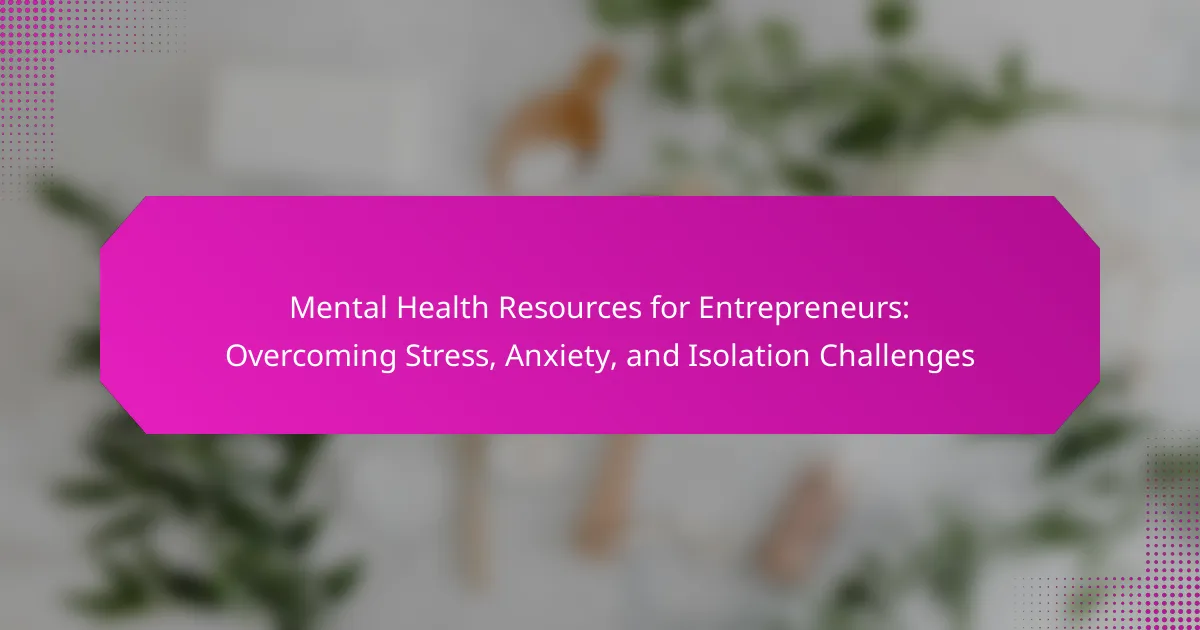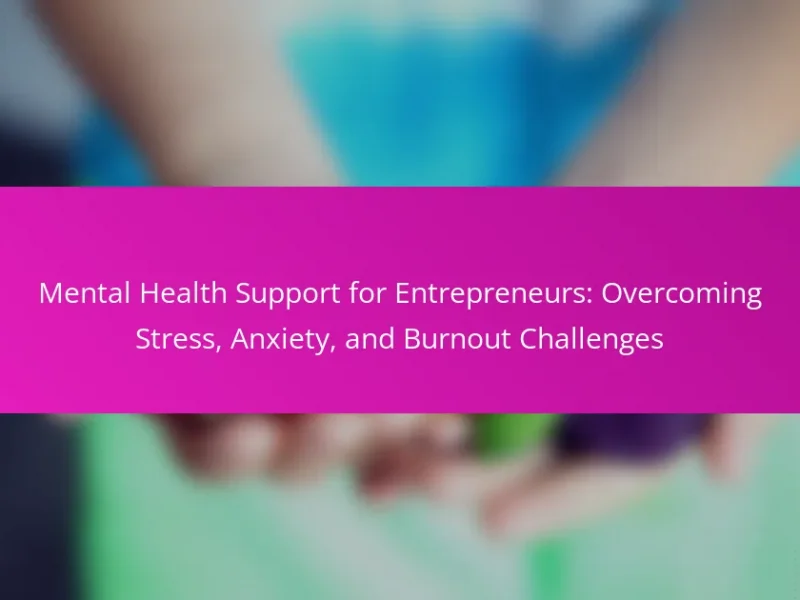Entrepreneurs often face significant mental health challenges, including stress, anxiety, and isolation. This article explores essential resources such as therapy, support groups, and mindfulness practices. It also addresses unique challenges faced by female entrepreneurs and emphasizes the importance of networking. By utilizing these strategies, entrepreneurs can improve their mental well-being and enhance productivity.

How do mental health challenges manifest for entrepreneurs?
Mental health challenges for entrepreneurs often manifest as stress, anxiety, and feelings of isolation. Entrepreneurs frequently face high-pressure situations, leading to overwhelming stress. This stress can escalate into anxiety disorders, characterized by persistent worry and fear. Isolation is another common issue, as entrepreneurs may feel disconnected from peers and support networks. A study found that 72% of entrepreneurs experience mental health issues, highlighting the need for targeted mental health resources. Addressing these challenges is crucial for maintaining well-being and productivity.
What are the common symptoms of stress and anxiety in business owners?
Common symptoms of stress and anxiety in business owners include fatigue, irritability, difficulty concentrating, and sleep disturbances. These symptoms can significantly impact decision-making and overall business performance. Additionally, physical manifestations like headaches, muscle tension, and gastrointestinal issues are frequent. Recognizing these signs is crucial for seeking appropriate mental health resources and support.
Why do entrepreneurs experience feelings of isolation?
Entrepreneurs often feel isolated due to unique pressures and responsibilities. The demanding nature of entrepreneurship can lead to stress and anxiety, creating a sense of disconnection from peers and support networks. Research shows that 70% of entrepreneurs experience feelings of loneliness, highlighting the need for mental health resources. Engaging in community support groups or seeking professional counseling can significantly reduce these feelings of isolation.

What universal resources can help entrepreneurs manage mental health?
Mental health resources for entrepreneurs include therapy, support groups, and mindfulness practices. These resources help manage stress, anxiety, and feelings of isolation.
Therapy offers personalized strategies for coping with challenges. Support groups provide community and shared experiences, reducing feelings of loneliness. Mindfulness practices, such as meditation, enhance emotional resilience and focus.
Utilizing these resources can significantly improve mental well-being, fostering a healthier work-life balance. Entrepreneurs who prioritize mental health often experience increased productivity and creativity.
What role do support groups play in mental health for entrepreneurs?
Support groups play a crucial role in enhancing mental health for entrepreneurs by providing emotional support and reducing feelings of isolation. They offer a safe space for sharing experiences, which can alleviate stress and anxiety. Regular interactions within these groups foster a sense of community, promoting resilience and coping strategies. Entrepreneurs often face unique challenges, and support groups can address these by sharing tailored resources and insights. Engaging with peers can significantly improve mental well-being, leading to better decision-making and productivity.
How can online therapy platforms benefit business owners?
Online therapy platforms can significantly benefit business owners by providing accessible mental health support. These platforms reduce stress, anxiety, and feelings of isolation, allowing entrepreneurs to maintain focus and productivity.
One unique attribute of online therapy is its flexibility; sessions can be scheduled around a busy workday, ensuring that mental health care fits seamlessly into an entrepreneur’s lifestyle. Additionally, many platforms offer various therapeutic approaches, which can be tailored to individual needs, enhancing the effectiveness of the treatment.
Research shows that entrepreneurs who engage in regular mental health care report higher levels of resilience and job satisfaction. This proactive approach can lead to better decision-making and improved business outcomes.
Overall, utilizing online therapy platforms empowers business owners to prioritize their mental health, ultimately fostering a more sustainable and successful entrepreneurial journey.
What are effective stress management techniques for entrepreneurs?
Effective stress management techniques for entrepreneurs include mindfulness practices, physical exercise, time management strategies, and seeking professional support. Mindfulness techniques, such as meditation or deep breathing, can reduce anxiety and enhance focus. Regular physical activity boosts mood and energy levels, while effective time management helps prioritize tasks and reduce overwhelm. Additionally, connecting with a mentor or therapist provides emotional support and practical guidance.

What unique mental health challenges do female entrepreneurs face?
Female entrepreneurs face unique mental health challenges, including heightened stress from balancing business demands and personal responsibilities. They often experience anxiety due to societal pressures and isolation from a lack of support networks. Research indicates that women entrepreneurs report higher levels of burnout compared to their male counterparts, exacerbated by difficulties in accessing mental health resources tailored to their specific experiences. Additionally, the stigma surrounding mental health issues can prevent them from seeking help, leading to a cycle of stress and isolation.
How does the pressure to succeed impact women in business?
The pressure to succeed significantly impacts women’s mental health in business, often leading to heightened stress and anxiety. This pressure can stem from societal expectations and the challenge of balancing professional and personal responsibilities. Women entrepreneurs frequently experience isolation, lacking adequate support networks. Mental health resources, such as counseling and peer support groups, are essential for addressing these challenges. Studies show that women in business are more likely to seek mental health resources, indicating a proactive approach to managing stress and promoting well-being.
What specific resources are available for female entrepreneurs?
Mental health resources specifically for female entrepreneurs include counseling services, support groups, and online platforms. These resources help address stress, anxiety, and feelings of isolation.
1. Counseling services offer personalized support tailored to the unique challenges faced by female entrepreneurs.
2. Support groups provide a community where women can share experiences and coping strategies.
3. Online platforms, such as forums and webinars, facilitate access to mental health education and professional advice.
These resources empower female entrepreneurs to manage mental health effectively while navigating their business journeys.

What rare mental health issues might entrepreneurs encounter?
Entrepreneurs may encounter rare mental health issues such as bipolar disorder, cyclothymia, or depersonalization-derealization disorder. These conditions can significantly impact their ability to manage stress and maintain productivity. Bipolar disorder, characterized by extreme mood swings, can lead to periods of high energy followed by debilitating lows. Cyclothymia presents a milder form of bipolar disorder with chronic mood fluctuations. Depersonalization-derealization disorder involves feelings of detachment from oneself or reality, which can hinder decision-making and social interactions. Awareness and access to mental health resources are crucial for entrepreneurs facing these challenges.
How can entrepreneurs identify burnout versus regular stress?
Entrepreneurs can identify burnout by recognizing persistent fatigue and diminished motivation, while regular stress often manifests as temporary anxiety and pressure. Burnout typically results from prolonged stress without adequate recovery. Signs of burnout include emotional exhaustion, reduced performance, and detachment from work. Regular stress may resolve with short breaks or changes in workload. Understanding these differences is crucial for maintaining mental health and productivity.
What are the signs of imposter syndrome in business owners?
Signs of imposter syndrome in business owners include persistent self-doubt, fear of being exposed as a fraud, and attributing success to luck rather than skill. They may also experience anxiety when facing new challenges, feel overwhelmed by their responsibilities, and struggle to accept praise or recognition. These signs can lead to stress and isolation, impacting overall mental health. Recognizing these symptoms is crucial for seeking mental health resources and support.

What role does networking play in overcoming mental health challenges?
Networking plays a crucial role in overcoming mental health challenges for entrepreneurs by fostering support and reducing isolation. Engaging with peers provides emotional reassurance and practical advice, which can alleviate stress and anxiety. Research indicates that 70% of entrepreneurs experience mental health issues, highlighting the need for community connections. Furthermore, networking can lead to collaborative opportunities, enhancing resilience and coping strategies. By building relationships, entrepreneurs can share experiences, resources, and strategies, creating a supportive environment essential for mental well-being.
How can building a support network alleviate feelings of isolation?
Building a support network can significantly reduce feelings of isolation by fostering connections and providing emotional resources. Engaging with peers offers validation and shared experiences, which can alleviate loneliness. Studies indicate that entrepreneurs with strong support systems report lower stress levels and increased resilience. Additionally, participating in group activities encourages collaboration and offers diverse perspectives, enhancing problem-solving capabilities. Ultimately, a robust support network serves as a vital asset in managing mental health challenges.
What are the benefits of mentorship for mental health?
Mentorship significantly enhances mental health by providing support, reducing feelings of isolation, and improving resilience. Mentors offer guidance that helps entrepreneurs navigate stress and anxiety, fostering a sense of community. Studies show that individuals with mentors report higher levels of emotional well-being and lower stress levels. Additionally, mentorship can lead to improved problem-solving skills, which further alleviates mental health challenges.

What practical steps can entrepreneurs take to improve their mental health?
Entrepreneurs can enhance their mental health by implementing structured routines, seeking professional support, and building a supportive network. Regular exercise, mindfulness practices, and setting boundaries also play crucial roles in managing stress and anxiety.
1. Establish a daily routine to create structure.
2. Engage in physical activities to boost mood.
3. Practice mindfulness or meditation to reduce anxiety.
4. Seek therapy or counseling for professional guidance.
5. Build a network of fellow entrepreneurs for support.
6. Set clear boundaries to maintain work-life balance.
What daily habits can enhance mental well-being for business owners?
Daily habits that enhance mental well-being for business owners include regular exercise, mindfulness practices, and maintaining a structured routine. These habits help reduce stress and anxiety while fostering a sense of connection and purpose.
Exercise, even in short bursts, releases endorphins, improving mood and energy levels. Mindfulness practices, such as meditation or deep breathing, enhance focus and emotional regulation. A structured routine provides predictability, reducing feelings of isolation and overwhelm.
Incorporating these habits can lead to long-term improvements in mental health, ultimately benefiting business performance and personal satisfaction.
How can entrepreneurs create a sustainable work-life balance?
Entrepreneurs can create a sustainable work-life balance by prioritizing mental health resources. Utilizing tools like therapy, meditation apps, and peer support groups helps manage stress, anxiety, and feelings of isolation. Research indicates that 72% of entrepreneurs experience mental health challenges, underscoring the need for proactive measures. Engaging in regular physical activity and setting clear work boundaries are also essential strategies for maintaining balance.
What time management strategies can reduce stress?
Implementing effective time management strategies can significantly reduce stress for entrepreneurs. Prioritizing tasks, setting realistic deadlines, and using tools like calendars and to-do lists enhance productivity. Techniques such as the Pomodoro Technique promote focused work periods followed by short breaks, which can alleviate anxiety. Additionally, delegating responsibilities can free up time and reduce overwhelm. Regularly reviewing and adjusting plans helps maintain balance and prevents burnout.

What expert insights can guide entrepreneurs towards better mental health?
Expert insights for entrepreneurs emphasize the importance of prioritizing mental health through proactive strategies. Implementing regular self-care routines, seeking professional support, and fostering social connections can significantly reduce stress and anxiety.
Studies show that entrepreneurs are at a higher risk for mental health issues due to isolation and high-pressure environments. Engaging in mindfulness practices, such as meditation or yoga, can enhance emotional resilience. Additionally, creating a supportive network of fellow entrepreneurs offers valuable opportunities for sharing experiences and coping strategies.
Utilizing mental health resources, such as counseling and wellness programs, can provide tailored support to address unique challenges. Entrepreneurs should also consider setting boundaries to maintain work-life balance, which is crucial for long-term mental well-being.
What common mistakes should entrepreneurs avoid in managing mental health?
Entrepreneurs should avoid neglecting self-care, isolating themselves, and ignoring signs of stress. Prioritizing mental health is essential for sustained productivity and well-being. Many entrepreneurs mistakenly believe they must always be available, leading to burnout. Establishing boundaries and seeking support can prevent these pitfalls. Regularly engaging in stress-relief activities and maintaining social connections are crucial for managing anxiety and isolation.
What best practices can entrepreneurs adopt for long-term mental health resilience?
Entrepreneurs can adopt several best practices for long-term mental health resilience. Regular self-care routines, including exercise and mindfulness, help manage stress levels. Building a support network fosters connection and reduces feelings of isolation. Setting realistic goals and maintaining work-life balance are essential for sustainable productivity. Seeking professional help when needed can provide valuable coping strategies. Engaging in continuous learning enhances adaptability and resilience in the face of challenges.


